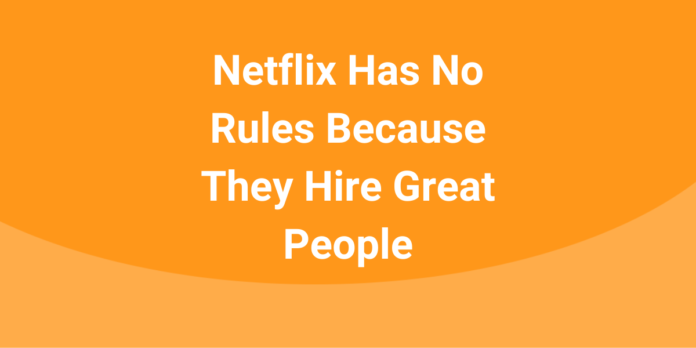
Previously I’ve written about the downside of rules at work and how rules can be replaced with accountability and transparency and trust. In this article I’d like to explore the foundational solution, which is hiring great people.
Do corporate rules really reflect a hidden hiring problem? What can we learn from Netflix ’s approach to culture and rules?
Netflix is well known as one of the great success stories of the last two decades. Launched as a DVD-by-mail company in 1998, they now have 3,500 employees and generate over $7 billion a year from 81 million subscribers to their online streaming service. Of course, they don’t just stream content—they also produce your favorite series like House of Cards, Orange Is the New Black, and Making a Murderer.
So what’s the key to Netflix’s sustained success? How does a company grow that fast, change business models so many times, and maintain a fanatical customer base?
Remember, rules are supposed to protect quality and consistency and profits as a company grows. Yet, at Netflix it’s not the rules they put into place that accounts for their success, it’s the absence of rules.
If you’re familiar with the technology startup scene, there’s little doubt you’ve heard of the “Netflix Culture Deck” and its legendary influence. Facebook COO Sheryl Sandberg called this simple PowerPoint presentation “one of the most important documents to come out of Silicon Valley,” and it’s been viewed millions of times across the globe.
In the famous presentation, Netflix leaders explain the traditional logic for rules and the short-term benefits of reducing mistakes. But the deck goes on to teach that over time a process-focused culture drives out the high-performing employees that companies aim to keep. When the market shifts quickly due to new technology, competitors, or business models, rule-driven companies can’t keep up and lose customers to competitors who adapt. In such an environment, slow-moving, rule-oriented companies grind “painfully into irrelevance.”
Netflix sums up its culture—and its competitive advantage—in on slide one:
Freedom And Responsibility
Instead of creating endless rules and processes, which is how most companies deal with major growth, Netflix asserted that a business should focus specifically on two things:
1. Invest in hiring high-performance employees.
2. Build and maintain a culture that rewards high-performers, and weeds out continuous, unimproved low performers.
Netflix posits that responsible people—the people that every company wants to hire—are not only worthy of freedom, they thrive on it. Creating an environment where these individuals are not inhibited by myriads of rules allow them to become the best version of themselves.
Taking this belief to its literal meaning has spawned a series of HR innovations that were previously unheard of. For example, consider the Netflix “unlimited vacation policy.” Instead of establishing a formally tracked vacation policy, Netflix decided to allow salaried employees to take as much vacation time as they liked. (Hourly workers were given a more structured policy.) Certain guidelines were provided; for example, those working in accounting and finance were asked to be in the office during the beginning or end of a quarter. Additionally, anyone that wanted more than 30 days off in a row should meet with HR.
Netflix also resisted the urge to institute any type of formal travel and expense policy. According to McCord, “we decided to simply require adult-like behavior… The company’s expense policy is five words long: ‘Act in Netflix’s best interests.’” Employees were expected to spend company money as it were their own, looking for opportunities to save when possible.







